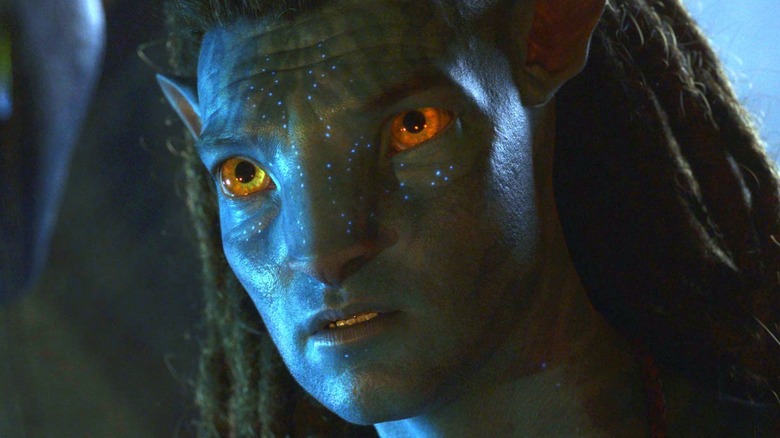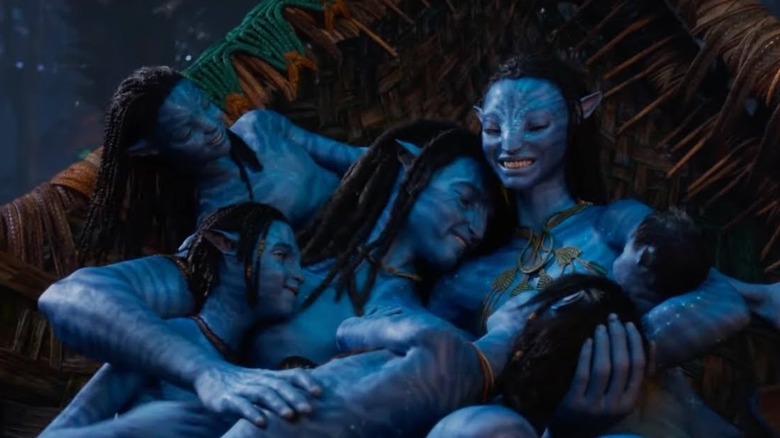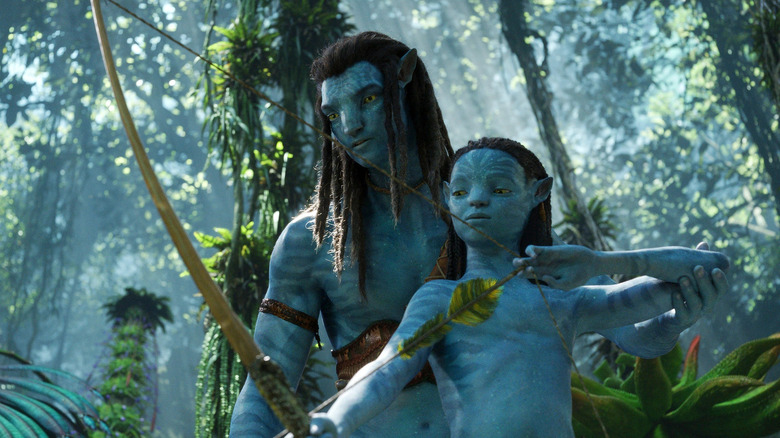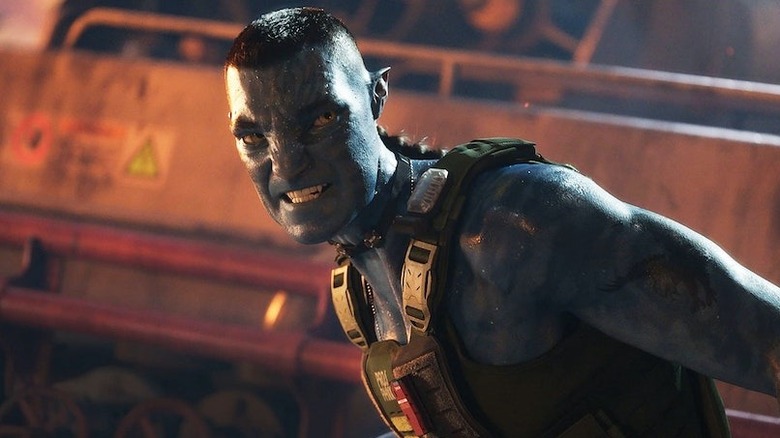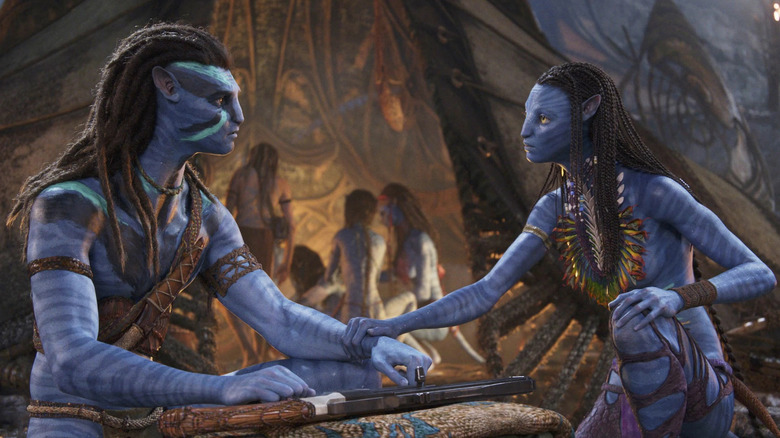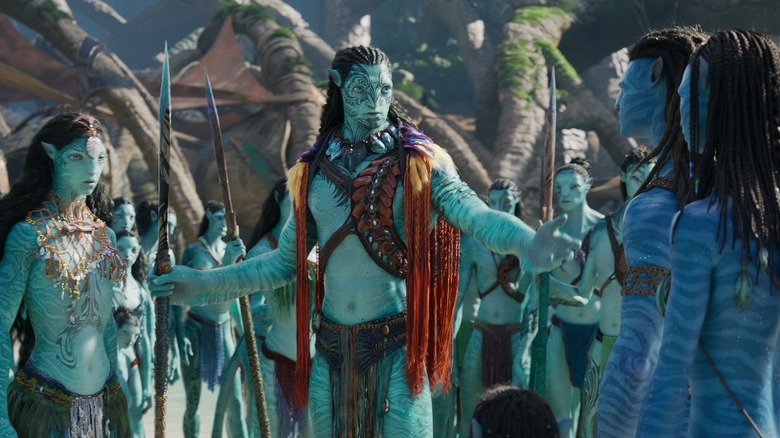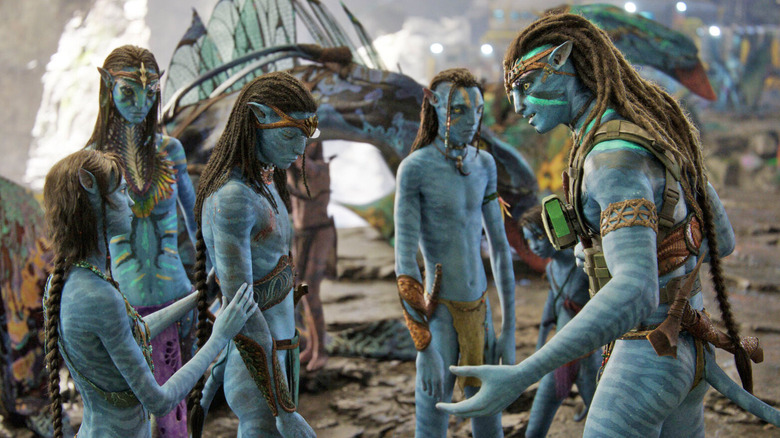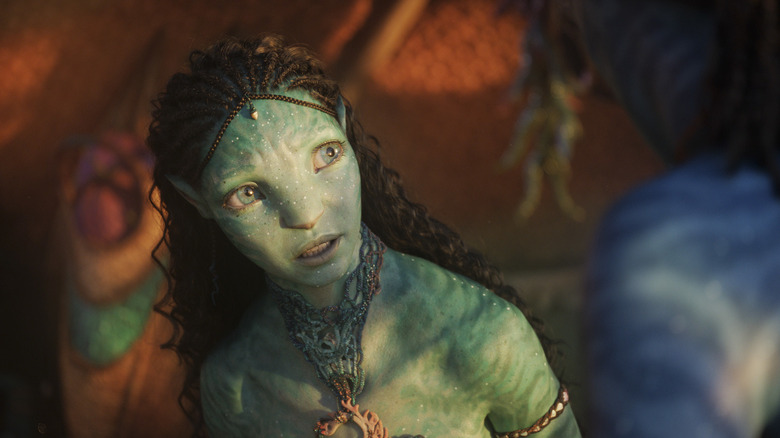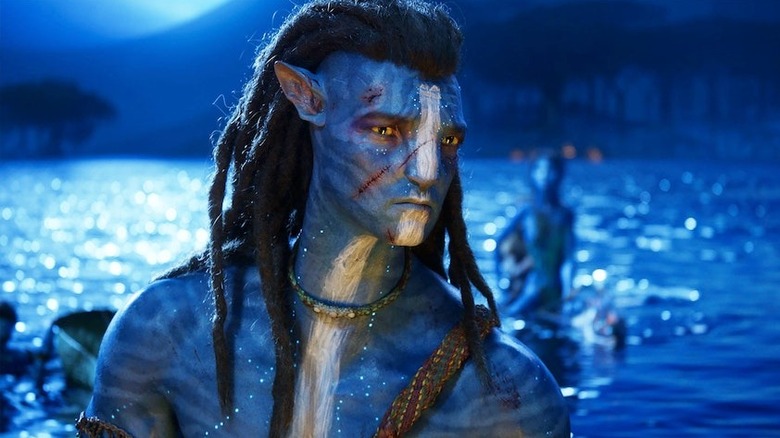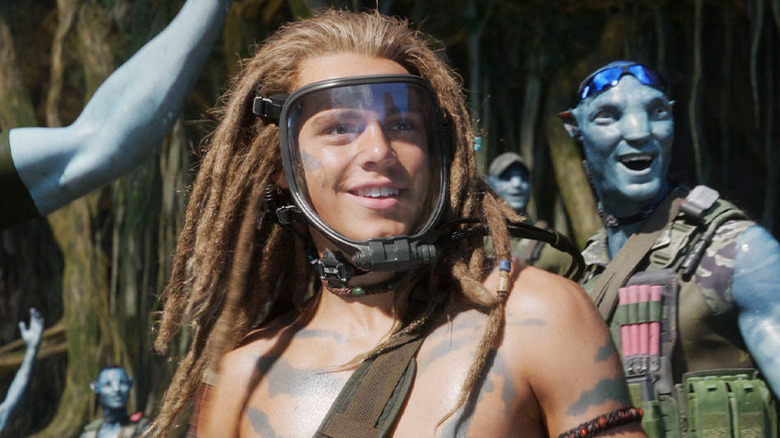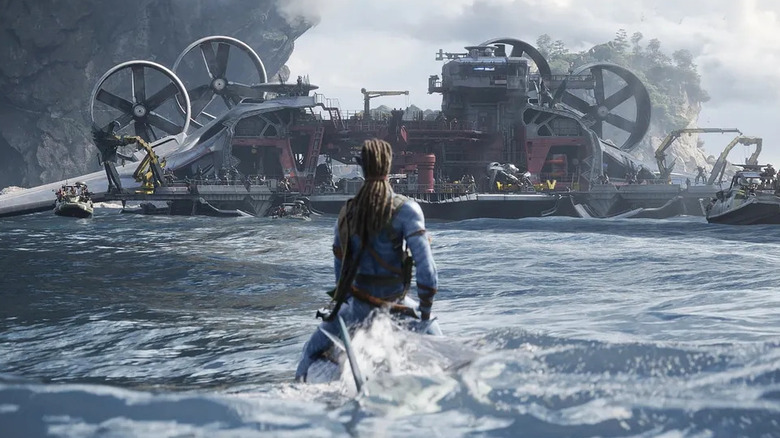Avatar: The Way Of Water Lines That Are More Important Than You Think
Action, sci-fi, and fantasy movies aren't always renowned for their writing. Story development might take years, and plot points within stories drastically impact elements like production design and fight choreography. But with visual effects typically being given top priority, the dialogue itself can feel like an afterthought.
That was one of the criticisms lobbed at the first "Avatar" in 2009, despite its overwhelmingly positive reviews. "Avatar: The Way of Water" similarly isn't likely to become known for its subtlety. In the long-awaited sequel, teenage aliens regularly refer to each other as bros, spy Avatar Marines shout "Get some!" and other cliches abound. Suffice it to say that, while "Avatar: The Way of Water" improves on the original in some areas, it hasn't improved much when it comes to nuanced dialogue.
Which, sort of, makes sense; it would be strange if Jake Sully suddenly sounded more articulate, intelligent or sophisticated, after eleven years away form his former kind. Despite the fact that most of the lines in "Avatar 2" are best described as serviceable, the script still includes some wit, some problem solving solutions, and some references to the original "Avatar" broader themes. While audiences probably weren't thinking too much about word choice as enormous, glowing whale-like creatures jumped out at them in 3D, these are the key lines that did double duty in "Avatar: The Way of Water."
Happiness can vanish in a heartbeat
The "Avatar" films have established a pattern. They begin and end with the framing device of Jake Sully's narration. In the prologue of "Way of Water," Jake waxes poetic about his beautiful, beloved wife and children.
Besides Neytiri (Zoe Saldaña), his family has grown to include adopted daughter Kiri (Signourney Weaver), oldest son Neteyam (Jamie Flatters), youngest son Lo'ak (Britain Dalton), and youngest daughter Tuk (Trinity Jo-Li Bliss). Jake has really taken to being a father; it's become an important part of his identity. Viewers get the sense that, after the traumatic destruction of Hometree, nature and the Na'vi people are healing as Jake explains that happiness is easy.
But then he warns, "The most dangerous thing about Pandora is that you might grow to love her too much." By this, he means his family, the Na'vi community that's taken him in, and the natural beauty and scientific wonder of the moon they all live on. Jake often tells Neytiri that he loves her in conjunction with her people and their world. It makes sense that he speaks this way; the Na'vi know that everything on Pandora is connected in the energy network that Grace identified. His fear of losing his happiness is a fear of losing his family, his clan, and his new home world. So when Jake's monologue ends with the line, "The thing about happiness is, it can vanish in a heartbeat," he's referring to his own and/or that of anyone he loves, as well as Eywa's (Jake also says that the Great Mother holds all her children in her heart, and Kiri later tells Jake she can hear Eywa's "mighty" heartbeat). The quote is tragic foreshadowing, indicating that someone's heartbeat is about to stop.
It might as well be English
In that opening monologue, Jake catches the audience up to speed on what he and the rest of the Sully have been up to for the last 10 years. The audience sees him welcome his children into the world, teaching them how to hunt and fish, and accompanying Neytiri on a twilight banshee-ride date night. As Jake describes each milestone in English, the rest of the Na'vi communicate with one another using the language Cameron and a linguist invented for the movie. Their lines of dialogue are subtitled in the traditional "Avatar" familiar Papyrus-like font. Then, Jake self-mockingly talks about how long it look him to speak it fluently. He concludes by saying that, now, "It might as well be English."
In that moment, Jake's family's dialogue switches to English; the audience is meant to understand that they're all speaking Na'vi. This is a slick scriptwriting/editing trick, a way to acknowledge and preserve Pandora's on-screen culture without making the actors do the entirety of their performance in subtitled Na'vi. The remainder of "Avatar: The Way of Water" is spoken almost entirely in English, except for moments where what's lost in translation is part of the plot.
I will kill you as many times as I have to
Jake admits that, though he and his kids love Spider (Jack Champion) — the feral boy left behind by the humans — Neytiri struggles to see him as anything but an outsider and a threat. At the beginning, the audience doesn't know if she's aware of the truth about his parentage, but by the end, it's clear that some of her hesitation about accepting the boy into their family has to do with the fact that he's Quaritch's son. It was Neytiri who dealt the depraved General a fatal blow with her father's bow and arrow at the end of the original "Avatar," which plays out again on the deceased human Quaritch's mech suit camera.
Recombinant Quaritch (Stephen Lang) lands on Pandora to seek revenge on the traitor Jake Sully. He essentially lucks into kidnapping his kids at the site of the old mobile lab, discovers Neytiri was responsible for his death, and is nearly able to take her out... all in the same scene. Before a pack of hammerhead titanotheres disrupt his plan, he shouts in her direction that he recognizes her call sign, the color of the fletches on her arrows. She recognizes his voice, and though she's confused, yells back, "I will kill you as many times as I have to." Jake and Neytiri think Recombinant Quaritch is at the bottom of the ocean, but Since Spider couldn't let him die after Neytiri held a knife to his neck and his father blinked, he'll most certainly be back in "Avatar 3."
One life ends, another begins
There's a great deal of talk about the life cycle in "Way of Water," and it begins long before the plot gets to the reef. After their encounter with Recombinant Quaritch, Jake realizes the humans are specifically targeting his family and decides the best course of action — for the Sullys and for the Omaticaya — is for them to leave. This is easier said than done. He's the clan leader, and according to their traditions, the old leader must die before the new one can assume his place. The incoming Omaticaya leader ceremonially stabs Jake in the chest as he says, "One life ends, another begins." With that, the Sully family takes to their banshees for parts unknown.
Throughout the film, there are myriad hints that Jake will die in this second part of what's expected to be (at minimum) a trilogy. This reference to his own metaphorical death is just one. Jake frequently talks about protecting his family at all costs, and about sacrifice, which primes viewers to think he's going to make the ultimate sacrifice when it comes down to it, to save his children and his people. That's exactly what the plot sets up in its third act. Quaritch has Jake's kids captive on the Sea Dragon, and he's only willing to exchange them for Jake's life. But the emphasis on Jake's mortality is all a red herring. Tragically, it's Jake and Neytiri's oldest son and golden boy, Neteyam, who doesn't survive the battle.
They will be like babies
When the Sullys arrive safety at the reef, Jake feels relatively confident the Metkayina people will grant them shelter since he is (or was) the great Turok Makto. The leader of the Metkayina clan, Tonowari (Cliff Curtis), knows of his legend and is welcoming but concerned about the possibility of war coming to his shores. His wife and the clan's medicine woman, Ronal, is much more skeptical. She correctly deduces that the Sullys had to leave High Camp because they posed a problem to the Omaticaya, and she doesn't want to bother teaching her ways to people who won't be receptive or capable.
"They will be like babies," Ronal counsels her husband. This is a callback to the first "Avatar," when Neytiri tells Avatar Jake that he has a strong heart but is otherwise like a baby. What she meant was that he was loud, clumsy, and unaware of his impact on the world around him. When her mother charged her with teaching Jake the ways of the Na'vi, she bristled, reasoning that they'd essentially have to start from scratch. While Ronal's daughter, Tsireya, is noticeably more up for the challenge, Ronal still realizes that it won't be easy for the forest Na'vi to fit in at the reef. Her comment is both a statement of prejudice and a reasonable attempt at isolating her clan from danger... two themes that run throughout the "Avatar" series.
We will adapt
The flip side of Ronal's line is Jake's answer to it. "We will adapt," he tells the Metkayina and his family. This short line can be read three ways. Literally, he uses himself as an example. He was born human, was injured and paralyzed, adapted to the use of a wheelchair, then adapted to the use of a Na'vi Avatar, and was finally accepted into Na'vi society with the permanent, true Na'vi body of his own.
Jake is also pointing out that, on a long enough timeline, the Na'vi physically adapt. It's obvious that evolution has made the Na'vi distinct from each other depending on the habitat in which they live. The Metkayina have evolved to have lighter and slightly greener skin, thicker and flatter tails, muscular, almost finned wrists, and the ability to hold their breath for an extended period of time. They've adapted to their ecosystem, as will have the clans of Na'vi audiences are likely to meet in "Avatar 3" and beyond. Given his circumstances, Jake is much less bigoted about this than other Na'vi.
The "Avatar" films are deeply interested in the intersections between technology, biology, and environmental science. Messages can be found throughout that not-so-discreetly plead with humans to be better stewards of their resources, their planet, and each other. On a higher level, Cameron is challenging humans to evolve to live in what Jake calls "the great balance" rather than to continue old, destructive habits.
The way of water has no beginning and no end
If "Avatar: The Way of Water" has a thesis statement, it's the words of the Metkayina people... wisdom that Tsireya imparts to a troubled-souled Lo'ak. "The way of water has no beginning and no end," she explains. "Water connects all things. Life to death. Darkness to light." She goes on to compare water to a womb that births us into a world which exists before we're here and remains after we die. It's a moving speech, made even more lovely by the actor's calm, contemplative delivery and the entrancing shots of Pandora's marine wildlife.
Tsireya's lesson is meant to make Lo'ak feel as though he's a part of something bigger than himself and his family, and more broadly, it's meant to teach the forest-dwelling Sullys about her clan's specific philosophy when it comes to the "great balance" that Jake speaks of... the great balance that Earth's humans don't respect. These Metkayina sentiments are religious in-world, but they likely represent the environmentally-conscious Cameron's personal philosophy in a metatextual way. If that philosophy sounds strikingly similar to the "Star Wars'" notion of the Force -—especially as a more mature and slightly jaded Luke Skywalker taught it to Rey in "The Last Jedi" — you're not alone. Both borrow from Eastern spiritual traditions like Taoism and pantheistic religions that revere nature.
My dad came from a star
Pandora's sky is one of its most spectacular but fraught features. Instead of days and nights with a sun followed by a moon up above, this habitable moon has an enormous planet — a gas giant called Polyphemus — on its horizon. It has regular eclipses and experiences the quantity of light like a season, with some period of its year dusky and some gleaming bright. But, like any big rock floating in space, the sky is full of stars. Lo'ak, trying to make his father sound like a hero for once, remarks, "My dad came from a star."
It's a touching moment, in theory. It shows that Lo'ak not only views his once-human father as a true Na'vi, but that he's mythologized his origin story to an extent that he'd probably never actually admit. But in the past 30 years, what appeared to be falling stars turned out to be spacecraft from Earth, sent for mostly nefarious purposes. It's the white light of a ship burning its way into Pandora's atmosphere, alerting Jake and Neytiri to the return of the humans at the start of "The Way of Water." And since the audience knows that Earth is dying and humans have little choice but to take over this distant moon by any means necessary, it's not the last time these young Na'vi will see an ominous star in Pandora's sky.
You just waste the rest?
Quaritch convinces his sort-of son, Spider, to ride along if not fully cooperate, so as to avoid the military's mental torture. He remains antagonistic to their efforts throughout his captivity, making fun of their slow speed and poor understanding of the Na'vi language. He's a Tarzan-like teen on a metaphorical island among the ten-foot-tall blue Jarheads until he meets marine biologist Dr. Ian Garvin (Jemaine Clement). As heartless and hot-headed alphas Quaritch and Captain Mick (Brendan Cowell) excitedly discuss the killing of tulkuns, a more subdued and guilt-ridden Dr. Garvin talks through each step of the operation with Spider.
Once their target — the mother whale that was Ronal's spirit sister — has been eliminated, the hunting party ventures inside her corpse, where a makeshift workspace has been erected. The team drills into the tulkun's brain, which Garvin tells viewers (in a bit of an exposition dump) is significantly more advanced than the human mind. Out comes a golden liquid... about enough to fill a thermos. Captain Mick pretends to throw the clear container right after he claims it is worth about $80 million. It turns out, Earth scientists have discovered this substance has the power to stop human aging.
"You just waste the rest?" Spider asks, incensed. This is meant to show how irresponsible modern industrialized humans are, compared to indigenous populations who live in harmony with their natural resources. The whaling operation's wastefulness is even more horrific once the film explains how acutely tulkuns think and feel.
I can't believe I'm tied up again!
One of the few jokes in "Avatar: The Way of Water" comes in the middle of a scene that is anything but funny. As youngest daughter Tuk has her wrists restrained, she whines, "I can't believe I'm tied up again!"
Despite the addition of about a dozen new main characters and loads of lore, the plot of "Avatar: The Way of Water" is deceptively straightforward. Jake Sully and his large family are on the run from Quaritch and his Recombinant war dogs. Their best tactic in getting the former Toruk Makto to surrender is to kidnap his kids, since he's incredibly open about the fact that protecting his family is what gives his life meaning.
In their first skirmish at the mobile lab, Quaritch almost accidentally snags three Sully children. After Spider takes a tumble, the team takes him back to base as a consolation prize. Hours later, at the reef, the Recombinants manage to capture Sully's kids again when they're trying to save Lo'ak's brother tulkun, Payakan, by removing a tracker. Even after Payakan comes to their rescue and breaks the ship into pieces with his nearly equal body mass, Tuk gets cuffed yet again. This plot complication happens maybe one too many times, but at least Cameron and his co-writers have a sense of humor about it.
